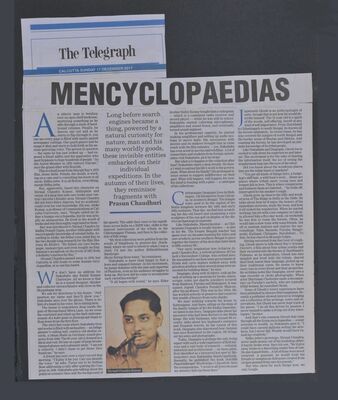Long before search engines became a thing, powered by a natural curiosity for nature, man and his many worldly goods, these invisible entities embarked on their individual expeditions. In the autumn of their lives, they reminisce fragments with Prasun Chatterjee.
An elderly man is bending over an open-shelf bookcase, muttering something as he sifts through a stack of hard-bound volumes. Finally, he heaves one out and as he starts to flip through it, you can see every page is filled with neatly pasted newspaper cuttings. One quick glance and he snaps it shut and starts to hold forth in his ancient quivering voice. The person in question — the same he has just looked up — had ex-posed a fraud sadhu and his apprentice who used hypnosis to dupe hundreds of people. "As did Anton Mesmer in 18th century Europe," says the grand elder with flourish. This is a fond scene from Satyajit Ray's 1974 film, Sonar Kella. Feluda, the sleuth, is working on a case and is consulting his know-it-all uncle, Sidhu Jetha. It is all fiction, everything, except Sidhu Jetha. Ray, apparently, based this character on Nirmal Chandra Kumar, bibliophile and owner of an establishment that sold rare books near central Calcutta's Entally area. Nirmal Chandra did not have fancy degrees, but no academic could rival his vast knowledge. His son, Aloke Kumar, a professor of Communications at Calcutta University, says, "People called my father a human encyclopaedia, but he was actually an antiquarian. He lived in the world of books and was thoroughly engrossed in them." Ray was introduced to Nirmal Chandra by Radha Prasad Gupta, another bibliophile with encyclopaedic knowledge of colonial India. According to Aloke, his father even aided Ray in his two-decade-long research for the film Shatranj Ke Khilari. "He hunted out rare books, maps, manuscripts and even bought an Englishman's scrapbook on the revolt of 1857 from a Sotheby's auction for Ray." Nirmal Chandra passed away in 1976 and Calcutta lost out on a Mencyclopedia.

